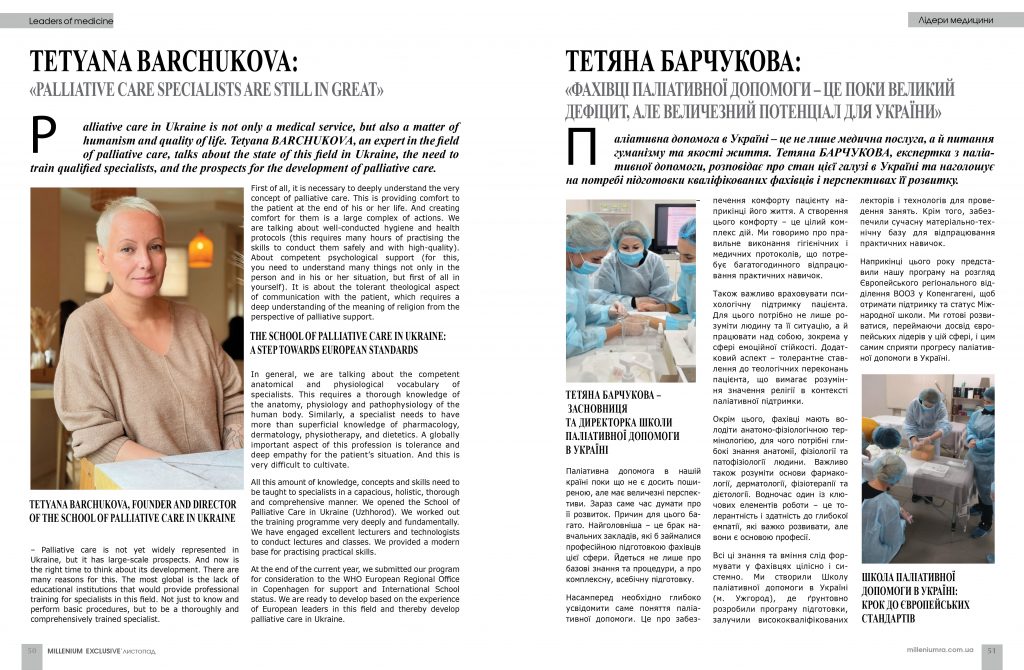Паліативна допомога в Україні – це не лише медична послуга, а й питання гуманізму та якості життя. Тетяна БАРЧУКОВА, експертка з паліативної допомоги, розповідає про стан цієї галузі в Україні та наголошує на потребі підготовки кваліфікованих фахівців і перспективах її розвитку.

– Паліативна допомога в нашій країні поки що не є досить поширеною, але має величезні перспективи. Зараз саме час думати про її розвиток. Причин для цього багато. Найголовніша – це брак навчальних закладів, які б займалися професійною підготовкою фахівців цієї сфери. Йдеться не лише про базові знання та процедури, а про комплексну, всебічну підготовку.
Насамперед необхідно глибоко усвідомити саме поняття паліативної допомоги. Це про забезпечення комфорту пацієнту наприкінці його життя. А створення цього комфорту – це цілий комплекс дій. Ми говоримо про правильне виконання гігієнічних і медичних протоколів, що потребує багатогодинного відпрацювання практичних навичок.
Також важливо враховувати психологічну підтримку пацієнта. Для цього потрібно не лише розуміти людину та її ситуацію, а й працювати над собою, зокрема у сфері емоційної стійкості. Додатковий аспект – толерантне ставлення до теологічних переконань пацієнта, що вимагає розуміння значення релігії в контексті паліативної підтримки.
Окрім цього, фахівці мають володіти анатомо-фізіологічною термінологією, для чого потрібні глибокі знання анатомії, фізіології та патофізіології людини. Важливо також розуміти основи фармакології, дерматології, фізіотерапії та дієтології. Водночас один із ключових елементів роботи – це толерантність і здатність до глибокої емпатії, які важко розвивати, але вони є основою професії.
Всі ці знання та вміння слід формувати у фахівцях цілісно і системно. Ми створили Школу паліативної допомоги в Україні (м. Ужгород), де ґрунтовно розробили програму підготовки, залучили висококваліфікованих лекторів і технологів для проведення занять. Крім того, забезпечили сучасну матеріально-технічну базу для відпрацювання практичних навичок.
Наприкінці цього року представили нашу програму на розгляд Європейського регіонального відділення ВООЗ у Копенгагені, щоб отримати підтримку та статус Міжнародної школи. Ми готові розвиватися, переймаючи досвід європейських лідерів у цій сфері, і цим самим сприяти прогресу паліативної допомоги в Україні.
TETYANA BARCHUKOVA: «PALLIATIVE CARE SPECIALISTS ARE STILL IN GREAT»
Рalliative care in Ukraine is not only a medical service, but also a matter of humanism and quality of life. Tetyana BARCHUKOVA, an expert in the field of palliative care, talks about the state of this field in Ukraine, the need to train qualified specialists, and the prospects for the development of palliative care.
– Palliative care is not yet widely represented in Ukraine, but it has large-scale prospects. And now is the right time to think about its development. There are many reasons for this. The most global is the lack of educational institutions that would provide professional training for specialists in this field. Not just to know and perform basic procedures, but to be a thoroughly and comprehensively trained specialist.
First of all, it is necessary to deeply understand the very concept of palliative care. This is providing comfort to the patient at the end of his or her life. And creating comfort for them is a large complex of actions. We are talking about well-conducted hygiene and health protocols (this requires many hours of practising the skills to conduct them safely and with high-quality). About competent psychological support (for this, you need to understand many things not only in the person and in his or her situation, but first of all in yourself). It is about the tolerant theological aspect of communication with the patient, which requires a deep understanding of the meaning of religion from the perspective of palliative support.
In general, we are talking about the competent anatomical and physiological vocabulary of specialists. This requires a thorough knowledge of the anatomy, physiology and pathophysiology of the human body. Similarly, a specialist needs to have more than superficial knowledge of pharmacology, dermatology, physiotherapy, and dietetics. A globally important aspect of this profession is tolerance and deep empathy for the patient’s situation. And this is very difficult to cultivate.
All this amount of knowledge, concepts and skills need to be taught to specialists in a capacious, holistic, thorough and comprehensive manner. We opened the School of Palliative Care in Ukraine (Uzhhorod). We worked out the training programme very deeply and fundamentally. We have engaged excellent lecturers and technologists to conduct lectures and classes. We provided a modern base for practising practical skills.
At the end of the current year, we submitted our program for consideration to the WHO European Regional Office in Copenhagen for support and International School status. We are ready to develop based on the experience of European leaders in this field and thereby develop palliative care in Ukraine.
